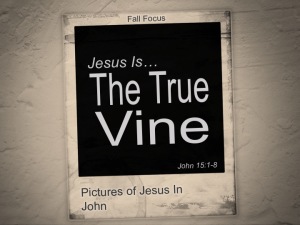by Shane Scott
“I am the vine; you are the branches. Whoever abides in me and I in him, he it is that bears much fruit, for apart from me you can do nothing” (John 15:5).
As the Lord spoke with his disciples one last time before the chaos of his crucifixion and resurrection, he told them, “In that day you will know that I am in my Father, and you in me, and I in you” (14:20). They then made their way from the upper room toward the Garden of Gethsemane. You can imagine that they passed by many vines on their way to Jesus’ special place of prayer. Maybe this is why Jesus used the imagery of a vine and branches in John 15 to illustrate the deeply interconnected relationship that he spoke of as “you in me, and I in you.”
When the eleven heard Jesus say, “I am the true vine, and my Father is the vinedresser” (15:1), their minds would have undoubtedly flashed back to a series of Old Testament descriptions of their nation. Throughout the Hebrew Scriptures God describes the people of Israel as a vineyard, a choice plot of ground cultivated and cared for by the Lord (Jeremiah 2:21; 12:10; Ezekiel 15:1-8; 17:7-10; 19:10-14; Hosea 10:1).
The most famous of these vineyard passages is a song found in Isaiah 5. In it, the prophet sets forth the tragic theme of this vineyard motif of the OT – Israel has been an unfruitful vineyard and faces judgment.
Let me sing for my beloved
my love song concerning his vineyard:
My beloved had a vineyard
on a very fertile hill.
He dug it and cleared it of stones,
and planted it with choice vines;
he built a watchtower in the midst of it,
and hewed out a wine vat in it;
and he looked for it to yield grapes,
but it yielded wild grapes.
And now, O inhabitants of Jerusalem
and men of Judah,
judge between me and my vineyard.
What more was there to do for my vineyard,
that I have not done in it?
When I looked for it to yield grapes,
why did it yield wild grapes?
And now I will tell you
what I will do to my vineyard.
I will remove its hedge,
and it shall be devoured;
I will break down its wall,
and it shall be trampled down.
I will make it a waste;
it shall not be pruned or hoed,
and briers and thorns shall grow up;
I will also command the clouds
that they rain no rain upon it.
For the vineyard of the Lord of hosts
is the house of Israel,
and the men of Judah
are his pleasant planting (Isaiah 5:1-7a).
There’s one more OT vineyard passage we should take note of. It is Psalm 80:7-19. This passage is framed by a plea for God to restore and save his people. It then describes Israel as a vine that God planted and cared for, only to be trampled by wild animals. So the psalmist begs:
Turn again, O God of hosts!
Look down from heaven, and see;
have regard for this vine,
the stock that your right hand planted,
and for the son whom you made strong for yourself. (Psalm 80:14-15, ESV)
Notice that in the last line, the imagery of the vine morphs into that of a person – a son. That’s what this Hebrew word means, although some versions render it “branch” (NKJV). And the idea may very well be that the branch is the offspring of the vine, just as a son is of his father’s “stock.” But this language also reminds us that Israel – the vine – is also described as God’s “son” (Exodus 4:22-23), as if the nation could be embodied in a single person.
And of course, that is exactly what the Gospel of John tells us about Jesus. Jesus has come to be the ultimate temple (John 2:18-22). By transforming the water of purification to wine (John 2:1-10), and personifying the great water and light ceremonies that took place at the great feast days (John 7:37-39; 8:12), Jesus came to fulfill the Law itself and point to the greater blessings of the Messianic age. By providing food in himself that was greater than Moses gave in the wilderness, Jesus came to surpass even Israel’s greatest leader (John 6:49-51). And of course, by offering himself as the lamb to take away the sins of the world, Jesus came to be the ultimate Passover (John 1:29; 18:39).
As we read Jesus’ description of himself as the “true vine” in John 15, then, what we are seeing is a remarkable claim. Jesus is teaching that he has come to be the vineyard of God (the “son” of Psalm 80:15) that ethnic Israel was supposed to be, but failed to be in faithless, fruitless disobedience. And his disciples, intertwined in fellowship with him, would be the first branches to sprout in this regrown vine.
With this biblical background in mind, here are some important applications from Jesus’ teaching here in John 15.
Abiding in Jesus is essential to spiritual life. Just as a sprig cannot survive if it is cut away from the vine, there is no spiritual life apart from Jesus Christ. “If anyone does not abide in me he is thrown away like a branch and withers” (15:6a). Throughout the gospel of John some people encountered Jesus and even recognized who he was, but refused to commit to him out of fear (12:42-43; 9:22). It is only through fellowship with Jesus that we can have life.
Abiding in Jesus will produce fruit. “Whoever abides in me and I in him, he it is that bears much fruit, for apart from me you can do nothing” (15:5b). There will be true signs of life in us spiritually – what Jesus here calls “fruit” – just as surely as there will be signs of life physically in a living vine and branch. Just as James teaches that genuine faith produces works (James 2:14-26), Jesus says that genuine life produces fruit. If there is no is fruit, there is no life, and God “takes away” that dead branch (15:2a).
Abiding in Jesus involves pruning. “Every branch that does bear fruit he prunes, that it may bear more fruit” (15:2b). On a trip to Israel several years ago I  was struck by just how far back the vinedressers pruned the vines. It looked severe to me (then again, I don’t know very much about horticulture – and these people have been doing this for centuries!). It is necessary for the health and growth of the vine. God’s pruning of us can certainly feel severe at times, but we can be absolutely confident that the Lord knows what he is doing, that just as the vine needs to be cropped to bear even more fruit, that our faith needs God’s pruning so that “it yields the peaceful fruit of righteousness by those who have been trained by it” (Hebrews 12:11).
was struck by just how far back the vinedressers pruned the vines. It looked severe to me (then again, I don’t know very much about horticulture – and these people have been doing this for centuries!). It is necessary for the health and growth of the vine. God’s pruning of us can certainly feel severe at times, but we can be absolutely confident that the Lord knows what he is doing, that just as the vine needs to be cropped to bear even more fruit, that our faith needs God’s pruning so that “it yields the peaceful fruit of righteousness by those who have been trained by it” (Hebrews 12:11).
By abiding in Jesus we can enjoy true life, bearing the fruit of Christ’s life in our own, all while enjoying the gracious refining of God. “By this is my Father glorified, that you bear much fruit and so prove to be my disciples” (15:8).

